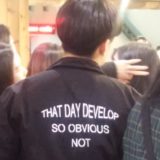Kicking Off The Couch to Korean Challenge
We are excited to announce two new projects that we will be launching on the Lexplorers site this week: the Lexplorers podcast and the Couch to Korean Challenge.
For the Lexplorers podcast, we are planning a series of conversations with people who have interesting and fun stories from their personal language learning journeys. We will focus particularly on how our guests’ language learning has led them to unexpected places and situations. Our first conversation in the podcast series will be with Carlos from the Lexplorers team. Carlos will talk about his Lexploration in Korean and how it has quite dramatically affected his recent life and his future plans.
This week we will also be kicking off the Couch to Korean Challenge, the first major language learning adventure that we will be writing about on the Lexplorers site. During the Couch to Korean Challenge, I (David) will be the guinea pig for a year-long experiment with one simple goal: to start from scratch, with absolutely no knowledge of the Korean language, and then learn as much Korean as possible within one calendar year. I will share the experience as I progress from a complete beginner toward the goal of being able to read, speak, and understand the Korean language.
The name of the challenge is a nod to the Couch to 5k, a program that encourages people to become more physically active. Couch to 5k provides inspiration and training plans to help people get off the couch and work toward the concrete fitness goal of completing a 5-kilometer race. Couch to 5k provides a direct analogy to the goal of getting off the (figurative) couch and working toward the mental fitness goal of completing a race to a new language. The comparison of language learning to training for a running race holds in many ways, such as first building a solid training foundation in miles (or words) and then working consistently to build up strength (or fluency) for the longer run. However, learning a new language is very different from completing a running race, primarily in the fact that there is no finish line!
Many runners keep extensive training logs, detailing mileage and courses run, weather and health conditions, equipment worn/used, and cross-training activities (e.g., cycling, walking, weight lifting). When training for a race, runners have good days and bad days, and the training log helps to document the progress along the way. I think it will be similarly interesting and useful to keep a Couch to Korean training log, including time spent studying different aspects of the Korean language, techniques and resources used, as well as “cross-training” activities like learning about Korean culture, history, and food.
Off the top of my head, the Couch to Korean training categories I would expect to work on and write about would be:
- Resources: finding, organizing, and evaluating available resources for learning Korean
- Language basics: history of the language and its language family, writing system, phoneme inventory and phonology
- Grammar: studying syntax, morphology, and other grammar details
- Vocabulary: studying word lists and flashcards to learn new words
- Reading comprehension: reading Korean texts to solidify grammar and vocabulary
- Listening comprehension: listening to instructional recordings, news, and other Korean audio sources to build aural comprehension
- Conversation: talking with native Korean speakers to practice speaking and listening
- Culture and history of Korea: the cross-training activities that will help put the language in context
It’s always an exciting prospect to start a new learning adventure, anticipating the many things I will be seeing for the first time. In this case, I look forward to learning how the Korean writing system works and whether the grapheme-to-phoneme mappings are simple or ambiguous. And I wonder about details like whether the language uses any phonemes that will be challenging for me to discriminate and produce? Does it have tones? Do Korean nouns have genders and/or cases? Is the morphology inflectional and/or derivational? Are there different formal and familiar pronouns and verb forms? What kinds of fun grammatical features does Korean have that I haven’t encountered before? I’m eager to find out, but, to be honest, a bit apprehensive as to the extent of the challenges ahead. Keeping with the Couch to 5k running metaphor, my couch is sitting in the middle of a deep, dark forest. I am anxious to stand up and start running, but I don’t know yet which direction to go nor how long it will take to reach the edge of the woods and see sunlight. I can’t see the tree roots waiting to trip me up, and I don’t know what kinds of wild animals are lurking in the darkness waiting to ambush me. But I won’t learn anything until I get up off the couch and accept the Couch to Korean Challenge!
Share this Lexplorers post:









